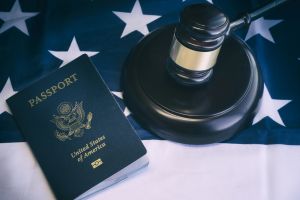Investing in the U.S. is a big move, and the E-2 Visa helps make that goal a reality. It is for investors from countries with U.S. trade treaties, ready to manage and grow businesses in the U.S. economy. Laredo, Texas, is a standout location with its strong trade and logistics network.
Keep on reading to know the E-2 Visa’s eligibility requirements, including nationality rules, investment guidelines, and business control. And if you focus on Laredo, there’s good news—local opportunities are everywhere.

A Brief On The E-2 Treaty Investor Visa
The E-2 Visa allows investors to come to the U.S. to develop and manage a business that they have funded. This Visa isn’t for passive income—it’s for people ready to be hands-on. The goal is to boost the U.S. economy through active business ventures.
E-2 Visa holders enjoy flexible travel and can bring spouses and children under 21. Spouses may apply for work authorization, and kids can attend school. Investors can renew their Visa indefinitely, provided they continue to meet the requirements. This makes it a strong choice for long-term entrepreneurs.
Nationality Requirements For Applicants
Applicants must be nationals of countries with a qualifying treaty with the United States. This treaty of commerce and navigation is a must. Without it, there’s no eligibility—no exceptions. Think of it as the foundation of the whole E-2 program.
Treaty Country Requirement
Only nationals from treaty countries are eligible to apply for the E-2 Visa. Your passport must match a country on the U.S. Department of State’s list. Dual citizens may choose the qualifying nationality, but only one can be used. It’s vital to be consistent across all documents.
List Of Eligible Countries
The list includes nations like Germany, Japan, France, Canada, and Mexico. Each country’s treaty can affect Visa length and renewability. Not every nation uses the same terms, so it’s critical to review specifics. The complete list is on the U.S. Department of State’s website.
Nationality Matters
Nationality proves that you’re from a treaty-aligned country and establishes the legal basis for your application. Without this link, the U.S. won’t approve the Visa. It’s not about where you live but the passport you carry. That’s why documentation must clearly show your citizenship.
Understanding nationality rules helps determine if you’re eligible before you start filling out paperwork. If your country’s not on the list, this Visa isn’t the path for you. Next, look at what kind of investment the U.S. expects from E-2 applicants.
Investment Criteria For E-2 Visa Eligibility
An investor must make a “substantial” investment to qualify. It doesn’t mean a fixed dollar amount. It means enough to make the business run and show that the investor is serious. The investment should show real financial commitment.
Substantial Investment
A substantial investment depends on the total cost of the business. For smaller ventures, the percentage of the total cost matters more. Typically, the lower the business expenditure, the higher the rate you must invest. It needs to be large enough to ensure the business operates successfully.
Acceptable Investment Types
You can invest in an existing business, start a new one, or buy a franchise. Each of these options works if it involves an actual, operating enterprise. Funds used must be traceable and from lawful sources. Passive investments—like stocks or undeveloped land—don’t count.
Risk & Commitment
The funds must be irrevocably committed to the business. You can’t just promise to invest—you must do it. The money must be “at risk,” meaning you could lose it if the business fails. Loans backed by business assets usually won’t qualify.
Meeting the investment standards helps prove the business is legitimate and not just a shell. However, ownership and control also matter. Now, take a closer look at that next.
Business Ownership & Control Requirements
E-2 Visa holders must show they have control over a U.S. business. It usually means owning at least 50%. If not, the applicant must demonstrate apparent authority to direct the company. Control is as important as the investment itself.
Minimum Ownership
You must own at least 50% of the business or demonstrate complete operational control. Your role must be precisely defined and dominant in a partnership. You must be involved in key decision-making and business operations. Just being a silent partner won’t qualify.
Shared Ownership
Shared ownership is acceptable as long as control is evident. If multiple E-2 applicants own the business, they must meet their Visa requirements. Confusing ownership structures can raise red flags. It’s vital to keep everything transparent and well-documented.
Managerial Control
You must have a say in day-to-day operations or major decisions. It could mean hiring staff, directing strategy, or managing finances. Investors who just collect profits without control don’t qualify. U.S. immigration wants active business leaders, not passive stakeholders.
Business ownership and control show that the applicant is steering the enterprise. But there’s one more thing to prove—intent to leave when the Visa ends.
E-2 Treaty Visa Intent Requirement
E-2 Visa applicants must show they plan to leave the U.S. when the Visa expires. It doesn’t mean you can’t renew the Visa or apply for another one later. But it does mean you can’t claim to be staying permanently. The Visa is strictly non-immigrant.
What Does Intent Mean?
You don’t need a plane ticket or a written statement. But you need to show you’re not planning to live in the U.S. forever—at least not on this Visa. Consular officers look at ties to your home country. Owning property, family connections, or work commitments abroad can help.
How Is Intent Evaluated?
Intent is judged based on the whole picture. Officers will consider your interview, supporting documents, and how you present your case. If your actions suggest you plan to stay indefinitely, your application may be denied. Staying within the Visa’s legal framework is key.
How Can It Affect Future Immigration?
The E-2 Visa doesn’t block future immigration paths. But you must apply for those separately. Using the E-2 Visa as a backdoor to permanent residency could hurt future chances. Always be honest and follow the correct legal process.
Showing intent to depart keeps you compliant and strengthens your application. Now, learn why Laredo, Texas, is a strong location for E-2 investors.
Local Considerations For Investors In Laredo
Laredo’s location makes it one of the busiest land ports in the country. Logistics, warehousing, retail, and real estate investors find strong demand here. Plus, business costs are generally lower than in larger metro areas.
Laredo’s economy benefits from constant truck traffic, industrial growth, and government support for trade development. Recent infrastructure projects are driving even more activity. The demand for service businesses—everything from restaurants to repair shops—is growing steadily. E-2 investors can take advantage of a wide range of opportunities.
The city’s bilingual population and cultural ties with Mexico make it a smooth transition point for international investors. Franchises, tech services, and property development are all gaining traction. Laredo’s growth is steady, making it a safer long-term play.
Laredo checks many boxes for investors looking to establish a solid business. Now, here are answers to the frequently asked questions.
Questions About The E-2 Investor Visa
Many investors ask the same few questions when they’re thinking about an E-2 Visa. Here’s a quick rundown of answers that cover the basics. Whether buying a franchise or opening a brand-new business, these details matter. Understanding them makes the application process smoother.
Should I Start A New Business Or Acquire An Existing One In Laredo?
Starting fresh isn’t required. You can buy an existing business—many do. It saves time and can simplify compliance. Just make sure it’s profitable and running legally.
Can My Investment Be A Franchise?
Yes, and many investors prefer that route. A franchise has proven systems and built-in branding. It can help show that the business is viable and lower your risk. You’ll still need to meet the investment rules.
How Long Does The E-2 Visa Last, & Can It Be Renewed?
It depends on the treaty terms in your country. Usually, Visas last up to five years, depending on the country of citizenship. You can renew it repeatedly in increments of two years if the business continues to operate and meets Visa requirements. There’s no fixed limit on the number of renewals.
These questions often pop up, and Lozano Law Firm is always ready to help answer more. Learn how its team can support your journey from idea to an E-2 Visa.
Lozano Law Firm Can Assist With E-2 Investor Visa Applications

Applying for an E-2 Visa can feel like solving a puzzle without all the pieces. At Lozano Law Firm, we help clients bring the whole picture together. We work side by side with investors to avoid delays and mistakes. Our goal is to keep the process smooth and stress-free.
We’ve handled a wide range of E-2 Visa cases. That experience helps us spot issues before they become problems. We help structure deals and documentation in ways that immigration officers understand. It’s about being thorough and direct.
Every investor’s goals are different. Some want a long-term franchise; others aim to build a family business from scratch. We listen first, then give clear legal guidance that fits your plan, not someone else’s. Whether it’s a new business or a strategic move, we’re ready to help you make it happen.
To qualify for an E-2 Visa, you’ll need to meet several vital requirements. That includes being from a treaty country, making a real investment, and demonstrating business control and an intent to leave. For the right investor, the E-2 Visa can offer a long-term opportunity in the U.S.
At Lozano Law Firm, we’re here to walk you through every part of the process. We’re ready to help you take the next step to invest in Laredo, Texas. Let’s build something real together.
Download Our E-2 Guide
Navigating The E-2 Treaty Investor Visa



